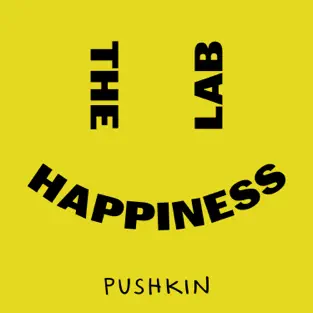The Happiness Lab
A great podcast for learning the science behind happiness.
book

So just get more money and be happier...?
Some of the ideas Dr. Santos presents may or may not be new to you. For example, we often think that more money and stuff, a better job, a perfect body, etc. will make us happier, or that negative life events will make us unhappier, but studies show that doesn't actually add up. Each positive change may help slightly at the lower ends - for example, going from extreme poverty to a livable wage, but jumping from $50,000 to $150,000 per year doesn't really make people happier.
The good news
Some of us are genetically wired to be happier, but all of us can learn to rewire our brains to see things in a more positive light, and those with a more positive outlook tend to have more positive things happen!
The bad news
One of the ways we can truly become miserable is the comparison effect. For example, if my neighbor just put in a new swimming pool, but I can't afford to do that. I really need a swimming pool now to be happy, so now I am miserable. Social media exacerbates the comparison effect because we are now constantly bombarded by people who seem to have what we want and it increases our sense of lack. Now we don't have enough friends, aren't pretty enough, don't have cool vacations or nice toys, etc.
Steps you can take to rewire your brain
Be kind
Studies show that we feel better each time we do one kind act. Furthermore, it will boost your social connections, and we know that social connections are key to well being.
Exercise and Sleep
Research suggest that 30 minutes of activity and at least 7 hours of sleep will boost your mood. Exercise will decrease your stress hormones and increase your feel good hormones.
Meditation and Gratitude
Research shows that meditation can have a number of positive benefits, including more positive moods, increased concentration, and more feelings of social connection. However, meditation is a practice of mind training which takes time and integrating into your daily life (I will be reviewing tools to help you with this later).
Gratitude increases happiness because it teaches you to focus on the positive aspects of your life and it can forge social bonds (going back to the social connections).
Goals and Intention
By becoming aware of our biases and working intentionally to overcome them by setting goals and starting new patterns, we can rewire our brains to be happier.
Want to go deeper?
Dr. Santos's course, The Science of Well-Being course is quite detailed and is set up for a ten week schedule with videos, readings and exercises for each day. There is no limit to how long you actually take, and you are free to skip around, but it is highly recommended as she provides the science as to why what we THINK makes us happy isn't always true and what we CAN do for our mental wellness. Did I mention that it is free?!?!
You can also listen to her podcast, The Happiness Lab, which addresses many of these topics and more. One of my favorite episodes was a deep dive into whether or not having a dog really makes you happier.
So what steps will you start taking today to improve your well being?
